Contact Distribution
Werner FeldbacherKey Account Manager |
Rüdiger WeichesmüllerKey Account Manager |
Registration
- BioAgenasol® is registered with InfoXgen and Fibl Germany, therefore authorised for use in organic agriculture.
- BioAgenasol® is certified according to SHC and NOP.
- BioAgenasol® is currently approved and on the market in the following countries:
AUSTRIA - BOSNIA AND HERZEGOVINA - BULGARIA - CARIBBEAN - COSTA RICA - CROATIA - CZECH REPUBLIC - ECUADOR - GERMANY - GREECE - HUNGARY - ITALY - PANAMA - POLAND - PORTUGAL - ROMANIA - SLOVENIA - SOUTH KOREA - SPAIN - TAIWAN - UZBEKISTAN
Dosage*
Fruits |
Vegetables |
Field crops |
|---|---|---|
|
|
|
* The quantities are to be seen as a general recommendation with proper fertilization. We recommend adapting the actual application rates to the regional soil and climatic conditions. Application possible with standard spreading equipment, promt incorporation is recommended.
Effect of BioAgenasol®
- BioAgenasol® is a purely plant-based complete fertilizer and soil activator from Austria with a fast and long-lasting effect that is approved for organic farming.
- BioAgenasol® is suitable for all types of fruits and vegetables as well as viticulture and crops. In addition to its nutrients, our fertilizer also offers a high level of wash-out safety and at the same time increases the water retention capacity in your soil. An important contribution against increasingly frequent dry periods. The yield and soil life is sustainably strengthened and improved.
The advantages of BioAgenasol®
- Promotes humus formation and therewith soil health
- Free of animal components
- Quick initial effect, long-lasting effect
- Effective even at low temperatures
- Pleasant scent (malty-bready)
- Lower risk of leaf scorch due to over-fertilization
- Harmless to humans and animals
BioAgenasol® – Improvement of plant health
Technical data
Nutritional Composition |
Physical properties |
||
| Organic components | > 90 % |
Bulk weight |
approx. 500 kg/m³ |
|---|---|---|---|
| Total nitrogen | 5.5 % | Grain size | 0,2-2 mm & 2–7 mm |
| Total phosphor | 2.5 % | Pellets | 3-4 mm |
| Total potassium | 1.5 % | Colour | medium to dark brown |
| Magnesium oxide | 0.6 % | Odour | wood/bread |
| Chloride-free | < 0.5 % | pH | 4.5 – 5.5 |
| Salt content | < 4.0 % | Shelf life | two years from delivery date |
| Calciumoxid | 0.15 % | Storage | protect from frost, moisture and direct sunlight |
Production BioAgenasol®
News
We have numerous new distribution partners in Austria, where you receive our new 20kg bags also in smale quantities for gardening.
For details please contact feed@agrana.com.
Exhibitions
The current dates for 2021/22 will be the following:
Bio Austria bauerntage - CANCELED!
25. - 27. Jänner 2022
Location: Wels, Schloss Puchberg
Website: https://www.bio-austria.at/v/bauern/bio-austria-bauerntage-2022/
ab hof messe - NEW date!
12. - 15. Mai 2022
Location: Wieselburg
Website: https://www.messewieselburg.at/
Washout experiments with pumpkins
The Styrian Agricultural Chamber conducted a scientific trial with oil pumpkins in 2016 in order to investigate the performance and the impact of the organic fertiliser BioAgenasol® in sensitive ground-water areas. BioAgenasol® was determined to be highly resistant to washout.
Laimburg trial
The Laimburg Research Centre conducted a scientific study in 2016 to investigate the effectiveness of the organic fertiliser BioAgenasol® and to compare this with the effectiveness of other organic fertilisers.
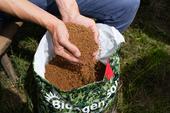
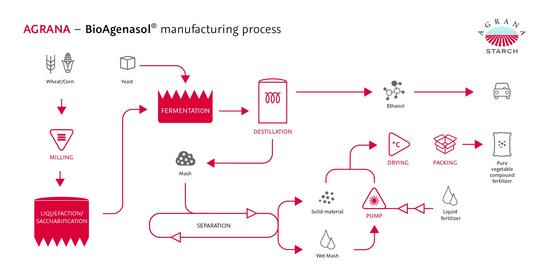
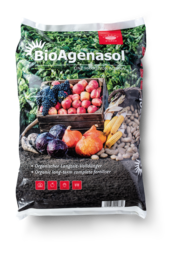
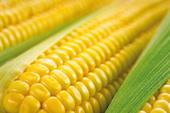

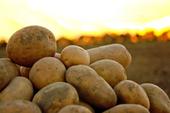

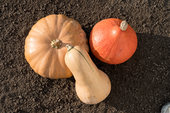
![Ergebnisse Auswaschversuch [Only available in german language]](/fileadmin/_processed_/c/2/csm_BioAgenasol_Nitratversuch_LKSteiermark_DE_7465b1d2dd.png)
![Summary of trial results [Only available in german language]](/fileadmin/_processed_/f/3/csm_BioAgenasol_Versuchszentrum_Laimburg_Zusammenfassung_Juli_2016_DE_fa85b826a6.png)
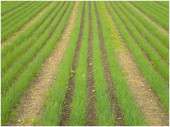
![Results [Only available in german language]](/fileadmin/_processed_/5/f/csm_Duengerversuch_bei_Schnittlauch_b298f7b1f4.png)
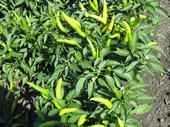
![Results [Only available in german language]](/fileadmin/_processed_/d/2/csm_Duengerversuch_bei_Einlegepfefferoni_99d4d93122.png)